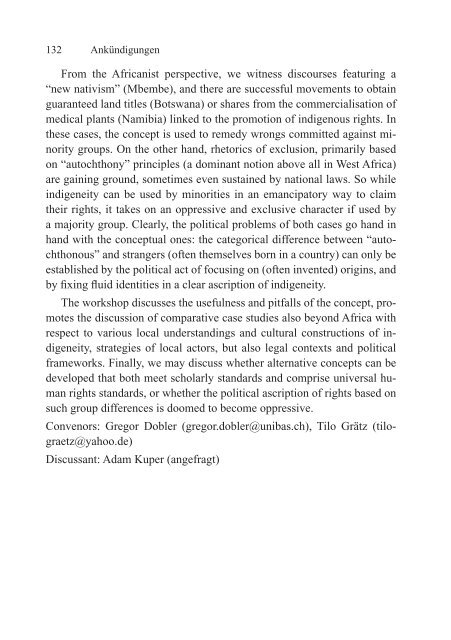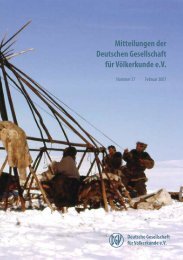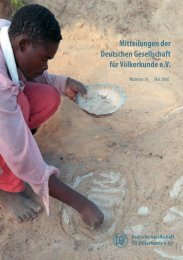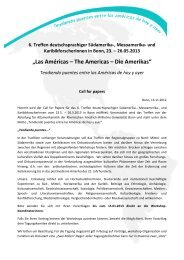Untitled - Deutsche Gesellschaft für Völkerkunde
Untitled - Deutsche Gesellschaft für Völkerkunde
Untitled - Deutsche Gesellschaft für Völkerkunde
Sie wollen auch ein ePaper? Erhöhen Sie die Reichweite Ihrer Titel.
YUMPU macht aus Druck-PDFs automatisch weboptimierte ePaper, die Google liebt.
132<br />
Ankündigungen<br />
From the Africanist perspective, we witness discourses featuring a<br />
“new nativism” (Mbembe), and there are successful movements to obtain<br />
guaranteed land titles (Botswana) or shares from the commercialisation of<br />
medical plants (Namibia) linked to the promotion of indigenous rights. In<br />
these cases, the concept is used to remedy wrongs committed against minority<br />
groups. On the other hand, rhetorics of exclusion, primarily based<br />
on “autochthony” principles (a dominant notion above all in West Africa)<br />
are gaining ground, sometimes even sustained by national laws. So while<br />
indigeneity can be used by minorities in an emancipatory way to claim<br />
their rights, it takes on an oppressive and exclusive character if used by<br />
a majority group. Clearly, the political problems of both cases go hand in<br />
hand with the conceptual ones: the categorical difference between “autochthonous”<br />
and strangers (often themselves born in a country) can only be<br />
established by the political act of focusing on (often invented) origins, and<br />
by fixing fluid identities in a clear ascription of indigeneity.<br />
The workshop discusses the usefulness and pitfalls of the concept, promotes<br />
the discussion of comparative case studies also beyond Africa with<br />
respect to various local understandings and cultural constructions of indigeneity,<br />
strategies of local actors, but also legal contexts and political<br />
frameworks. Finally, we may discuss whether alternative concepts can be<br />
developed that both meet scholarly standards and comprise universal human<br />
rights standards, or whether the political ascription of rights based on<br />
such group differences is doomed to become oppressive.<br />
Convenors: Gregor Dobler (gregor.dobler@unibas.ch), Tilo Grätz (tilograetz@yahoo.de)<br />
Discussant: Adam Kuper (angefragt)








